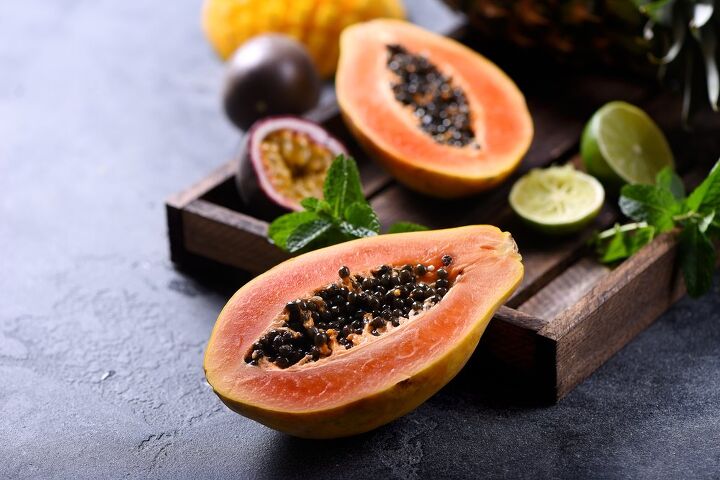If you’re scratching your head wondering what the heck is papain and where or why would you even begin to look for it, the answers are easy. The natural version of papain is found in your grocery store’s produce section and you may recognize it better as papaya.

As for what it is, papain is a powerful proteolytic enzyme that is found in abundance, in fresh papaya. It’s also available as an over-the-counter pill or powder supplement for when fresh fruit is not a viable option for your pet. And while it's safe for canine consumption, there are a few cautions you should be aware of. So, let’s take a look.
Benefits of Papain
Let’s start with why you would offer your dog that super-tasty slice of papaya. Because in addition to being chockfull of vitamins, calcium, magnesium, and fiber, the papain enzyme is renowned for breaking down proteins, improving digestion, and helping your pet better absorb nutrients. In fact, papain in its various formats has been used to treat health issues including joint pain and inflammation, irritable bowel disease, as well as to help cleanse chemicals from the body that are known to trigger allergic reactions.
And while the name may be new to you, papain’s ability to break down proteins has made it not only a popular digestive aid but also an age-old method for tenderizing meat. In fact, you’ll often find the powder format sold as a culinary additive and produced by many of the leading spice manufacturers. Seriously, check out Amazon.
Yay or Nay to Upping Your Dog’s Enzyme Count
The jury’s out on whether papain should be systematically added to your dog’s food. In other words, while it’s safe and enjoyable to share fresh papaya with your pooch from time to time, does he actually require it (or a powder variation) to be introduced to his daily feeding schedule? Those arguing against, feel that a dog’s natural enzymes are all he needs to break down a healthy daily diet of quality food. Others feel that today’s modern diets don’t always deliver the enzymes he needs, and supplementing them will help keep your pet’s digestive system and overall immune system, running smoothly.
Possible Side Effects
Almost every natural and herbal supplement can pack a punch. They are not innocuous and can potentially interact with any medications your pet is taking. Whether it’s in a fresh fruit format or simply powdered, adding a booster of papain enzymes is not recommended if your pet is taking prescriptions, over-the-counter medications, or even other vitamin-based therapies.
And unless he has a known deficiency such as chronic pancreatitis where adding an enzyme supplement can help alleviate the stress on this important organ, the addition of enzyme-rich foods or powders to his diet, shouldn’t really be necessary. In fact, providing this type of supplement on a regular basis can actually suppress your pet’s pancreatic activity over the long term, causing it to rely on the added enzymes in order to break down foods.
Portion Control
If you’ve decided your dog really could benefit from a daily boost of healthy enzymes, clear it with your vet first.
Once you have their blessing, consider the enzyme source. If you’ve chosen to go the fresh papaya route, be sure to peel it thoroughly, remove the seeds (which can be toxic), and cut the fruit into small chunks. And because historically fresh fruit has never been part of a dog’s daily diet, stick to just two to three pieces a couple of times a week. Any more and even dogs who welcome a boost in digestive support may find the added sugar and fiber gives them diarrhea. Note that we’re talking fresh, raw papaya – not dried or canned which can bring added sugars into the equation. And for dogs who are diabetic or overweight, you’re best to stick with the powdered papain supplement rather than the actual fruit.
If you decide to go with a powdered version, it should be measured and mixed into your pet’s food 15 to 20 minutes before he eats. For tablets, offer them to your pooch just before his meal is served. And with both of these variations, read the labels to ensure you’re providing the recommended dosage for your pet’s weight.
Additionally… because enzymes come in multiple formats, monitor your pet’s intake carefully. That means that if Rover is getting the powdered supplement, papaya should be off the menu and you may need to rethink your use of enzyme waters to promote dental health.
A Final Thought
There’s no easy way to segue from talking tasty papaya into the world of dog poop, but here goes. If your pooch tends to “consume” feces, papain may help eliminate this compulsion. According to the American Kennel Club (AKC), the diet of today’s dog is typically high in carbs and low in meat-based proteins and fat. As a result, your dog may gravitate toward a digestion “supplement” if you get my drift. Because papain enzymes help break down foods and promote a healthier gut, he’s going to be less likely to self-help when the Umm, opportunity presents itself.
In the end, there’s no harm in sharing a piece of that juicy papaya he’s been eyeballing. But if you’re considering adding this enzyme supplement on a daily basis, run it past your vet first.














